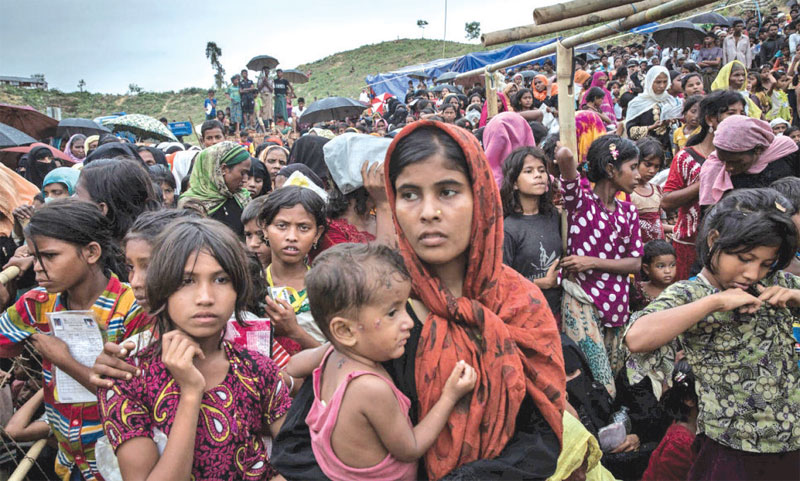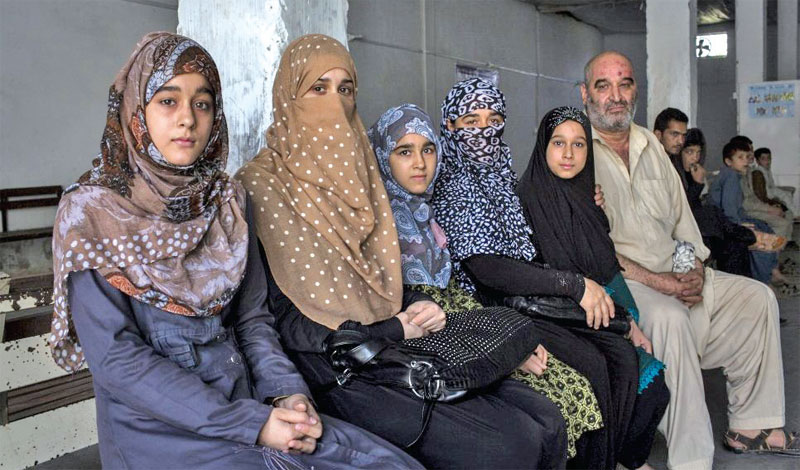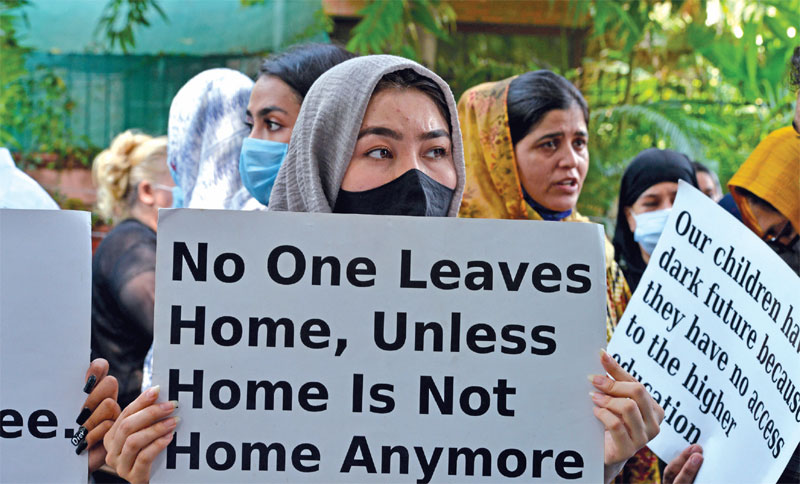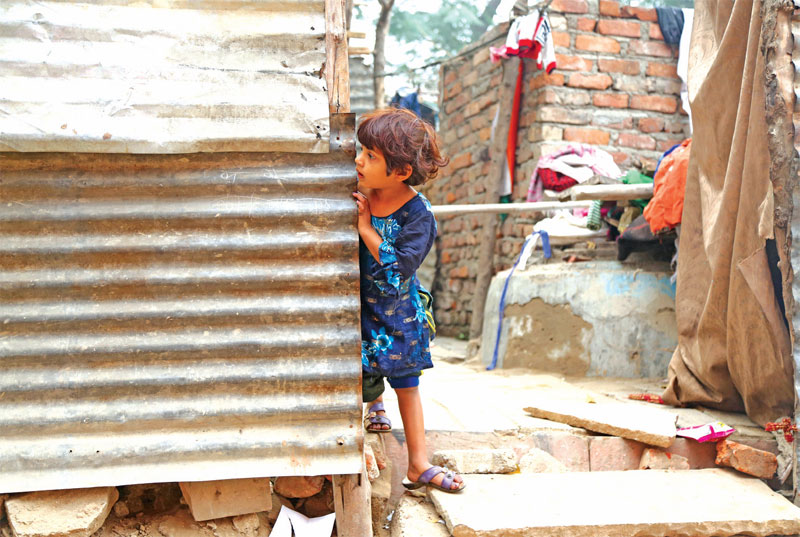Democracy is threatened when refugees are targeted by right wing political agenda
 Nandita Haksar
Nandita Haksar
Every one person in 88 is a refugee in the world. At least 89.3 million people around the world have been forced to flee their homes. Among them are nearly 27.1 million refugees, around half of whom are under the age of 18. There are nearly five million people seeking asylum, wanting to be officially recognised as refugees.
Who is a refugee?
The 1951 Refugee Convention defines a refugee as ‘someone who is unable or unwilling to return to their country of origin owing to a well-founded fear of being persecuted for reasons of race, religion, nationality, membership of a particular social group, or political opinion.’
A refugee is someone who had a home, a family, many times had a good job and a future to look forward to until one day his or her country is engulfed in violence, deadly conflicts and even wars. The person may become a target because he or she belongs to a particular ethnic community or has taken a political stand which has become so dangerous that it could land the person in jail or perhaps tortured and detained. There is no choice but to escape, often with nothing except the clothes he or she is wearing and usually without legal documents. Many times it is just too dangerous to have any identity paper so the person cannot carry any travel documents, not even an identity card.
The refugee crosses international borders without travel papers and since he or she does not have a passport or visa, their entry is illegal. If it was not for refugee laws, they would be classified as illegal migrants. Sometimes, they have to rely on human traffickers to take them across borders and sometimes they take dangerous boat rides across seas or walk across mountains and deserts only to be pushed back or detained.
The United Nations Convention for refugees passed in 1951 is still the basis of refugee protection laws around the world, even in countries like India which are not signatories to the convention. Despite all its imperfections it is the only legal protection that refugees have. Now even that mechanism is being dismantled, just when the world is faced with an unprecedented refugee crisis.
Refugee Crisis
The refugee crisis became the focus of media attention in 2015 when an estimated 1.3 million people, men, women and children arrived at the borders of Europe seeking asylum. It was the largest number of refugees since World War II. Those requesting asylum in Europe in 2015 were mostly Syrians, but there were also a significant number of Afghans, Nigerians, Pakistanis, Iraqis and Eritreans.
Refugee protection laws and mechanism have been undermined by changes in the laws designed to discourage refugees from entering Europe. In 2016, Sweden began issuing three-year residence permits to recognised refugees instead of permanent residency. The same year Denmark passed a law permitting the police to confiscate valuables like jewellery and cash from refugees.

Long before the refugee crisis of 2015, many countries had put in place laws and mechanisms that clearly violated all norms of international humanitarian and refugee law. For instance, in 2001, Australia’s offshoring asylum programme specifically targeted migrants arriving in Australian waters by boat. Asylum seekers have been taken to offshore detention centres in Papua New Guinea’s Manus Island and the South Pacific island nation of Nauru for their claims to be processed. However, the claims are not processed for years.
The policy—known as the ‘Pacific Solution’—was dismantled in 2008, but it was revived in 2012 and became more restrictive in 2013, when the government announced that people arriving by boat would be denied resettlement even if recognised as refugees.
The cruel and barbaric treatment of those detained at the Island was exposed by Behrouz Boochani, the Iranian Kurdish journalist, who found himself detained on Manus Island. He sent out reports on the conditions in the detention camp though Whatsapp messages on his smart phone. Despite the exposure, Australia did not grant him refugee status and it was after six long years of detention that New Zealand granted him asylum.
Detention Camps
Similar policies of keeping asylum seekers in detention camps is followed by Europe as well as Israel. The European Union has indirectly supported these offshore asylum programmes as part of broader efforts to stop refugees coming across the Mediterranean.
The Danish government has a deal with Rwanda. This is justified on the ground that sending asylum seekers to poor African countries discourage the network of human traffickers that characterises migration across the Mediterranean today. The EU Commission has said relocating refugees outside Europe is “not possible” under current EU rules, but Denmark is exempt from some EU regulations, including asylum standards because of an opt-out. (https://www.context.news/socioeconomic-inclusion/besides-britain-which-nations-send-asylum-seekers-overseas)
The bloc has paid Turkey billions of dollars to keep refugees from reaching Greece and has funded the Libyan Coast Guard, which pushes migrant boats bound for Europe back to North Africa. It is also helping to fund UN-run centres in Niger and Rwanda to process asylum seekers.
Under a UN programme called the Emergency Transit Mechanism, more than 3,000 people from Libyan detention centres who were heading for Europe have been transferred to Niger.
These policies are supported and upheld by academics specialising in refugee studies. Refugee studies has become an academic discipline with courses being taught on international refugee law. One of the textbooks on refugee law, which is taught across the world, is The Refugee in International Law by Guy S. Goodwin-Gill. The professor has been editor-in-chief of the Journal of Refugee Studies. Prof Goodwin-Gill, who has spent his academic life promoting the importance of the Refugee Convention all over the world, has led a discussion entitled The Refugees Convention: Why Not Scrap It? This was the subject of the discussion at the International Law Programme Group of Chatham House on 20 October 2005.

India’s Stand
If the Refugee Convention is scrapped and the United Nations High Commission for Refugees (UNHCR) is wound up, why should India care? After all, Indian academics and political leaders have been critical of the Refugee Convention from its inception. The main criticism was that the Convention was being Euro-centric.
In a 1998 paper entitled The Geopolitics of Refugee Studies: A View from the South (published in the Journal of Refugee Studies), Indian expert B S Chimni argued that in “the post-1945 period, the policy of western states has moved from the neglect of refugees in the Third World to their use as pawns in Cold War politics to their containment now.”
The UNHCR on its website admits that “the office of the United Nations High Commissioner for Refugees was created in 1950 during the aftermath of the Second World War to help millions of Europeans who had fled or lost their homes. We had three years to complete our work and then disband.” In 1954, the UNHCR won the Nobel Peace Prize for its ground-breaking work in Europe.
The UNHCR had played no role in the refugee crisis in the aftermath of the partition of India or the partition of Palestine. The UN set up another organisation to deal with Palestinian refugees in 1950 called the United Nations Relief and Works Agency for Palestine Refugees (UNRWA). The controversies surrounding the role of the UNRWA are not the subject of this article.
The definition of a refugee is framed in terms of the individual. Therefore, the UNHCR and domestic agencies in western countries have an elaborate procedure by which they determine whether a person seeking asylum is a refugee or not, based on whether he or she has faced persecution and going back to his country of origin could place him or her in danger. This process sometimes takes weeks and even years. Recent Security Council resolutions on terrorism make express reference to refugees and talk about the need for states to ensure the asylum process does not accommodate terrorists. But there is still no international definition of what constitutes terrorism.

Double Standards
Refugee advocates have, however, argued that when there is good information about conditions in a country, it is not necessary to go through this process for each individual as it can be determined prima facie that everyone from countries such as Iraq, Syria or Afghanistan should be accorded refugee status. This was what was done in case of refugees from Europe in the past as well as more recently in Ukraine.
The racist and double standards of the West were exposed when anyone coming from Ukraine was automatically granted refugee status and in some cases citizenship without going through an individual refugee status determination process. European governments opened their borders in an unprecedented show of solidarity towards the refugees even as the Greek coast guard continued to push back asylum-seekers crossing from Turkey. The Spanish police did the same. The western media’s racist bias was fully exposed when they reported that Ukrainian refugees were after all from Europe, they looked ‘like us’ with blue eyes and blond hair and they drove out in cars that looked like ‘our cars.’
The West has criticised South Asian countries, including India, for not ratifying the 1951 Refugee Convention. Afghanistan ratified the Convention in 2005. There are good reasons why India chose not to ratify the Refugee Convention of 1951 and does not recognise the UNHCR although India allows the organisation to have its offices in Delhi and Chennai.
Despite the fact that India is not a signatory to the 1951 Refugee Convention it has welcomed a large number of refugees from its neighbouring countries as well as from all over the world. There are refugees from Tibet, Sri Lanka and Myanmar. In addition, there are refugees from West Asia, including Iran, Iraq and Syria. There are also refugees from African countries and then there are a substantial number from Bangladesh and some from Pakistan.
It is true the treatment of these refugees has not been the same and only a few have been able to integrate into Indian society. But many of these refugees have lived and worked in India, some have even got Indian citizenship. Indians have rented their accommodation and looked after refugees and bonds of friendship have been formed.
Refugee Protection
The UNHCR, too, has played a positive role in refugee protection in India. In the past they provided financial assistance to all refugees recognised under their mandate. In addition, they provided basic educational and health facilities. There were also provisions for senior citizens, women and children. More importantly, the refugees recognised under the mandate of the UNHCR were given residential permits or long-term visas. This allowed the refugees to open bank accounts, work and getting their children admitted in schools. The UNHCR also helped refugees to get resettlement in third countries and many were able to go to the West and rebuild their lives there.
The courts also recognised the rights of refugees as being a part of their right under Article 14 and 21 of the Indian Constitution, which are available for all persons irrespective of their being citizens of India. The courts also recognised the basic right of a refugee not to be deported to his or her country of origin if there is danger to the person’s life. This is the right of non-refoulement. These rights are rooted in the definition of a refugee under the UN Refugee Convention, 1951.
Refugees come to India because they have heard that India is a tolerant country, a country which led the Non-Aligned Movement and is a friend of Third World people. But now all this is changing and at a rapid pace.

Stand Change
The government of India has stopped giving residential permits to even those refugees recognised by the UNHCR, a majority of these refugees do not have residential permits or long-term visas. As a result, they cannot apply for Aadhaar cards, which means they cannot open a bank account. Many of those who received financial support from friends abroad now cannot receive any money. They cannot get their children admitted to schools or get work.
Women refugees used to get health facilities under schemes for weaker sections but now without an Aadhaar card they cannot get even an ultrasound done. Speaking to refugees from Myanmar, I discovered that many of them work in factories around Vikaspuri with wages as low as Rs 7,000 for men and Rs 5,000 for women. If a couple pool in their earnings they can afford to rent out a room for Rs 5,000 but then there are electricity and water bills, children’s education and food. Not to speak of fuel, especially in the bitter cold.
The refugees face police harassment. Their UNHCR cards are thrown at their faces and told they are illegal migrants in the eyes of the law. On the borders refugees from Myanmar are being pushed back. Those who manage to enter have been arrested and detained.
The UNHCR has started keeping asylum seekers waiting for more than two years before giving them refugee status. Even when it does it offers very little support by way of financial assistance. Recently, it distributed blankets but it was one per family. A Palestinian family of eight, for instance, got one blanket, that too was very thin.
The doors of the UNHCR are firmly shut in the face of the refugees who collect outside and shout slogans, camp outside the office to protest, demanding protection. They are beaten and sometimes the UNHCR security calls the police.
Migrants vs Refugees
The stand of the government of India is that there are no refugees in India, only illegal migrants. The fear psychosis has been fuelled by the media, which says that India is being infiltrated by foreigners and that the refugees are a security threat to the country. Some Security Council resolutions on terrorism make express reference to refugees and talk about the need for states to ensure the asylum process does not accommodate terrorists.
In Europe and in the US, right wing populist parties capitalised on the refugee crisis and made anti-immigration the centre piece of their political platform. The liberal media in the West too contributed by calling the refugees fleeing the war and conflict in Syria as migrants. By conflating refugees with migrants the problem has been made even more complex. A migrant is someone who voluntarily goes to another country seeking better opportunities and to settle there. A refugee is one who seeks asylum and many times returns to his country of origin when there is no longer any danger to his or her life.
In India the issue of migrants has taken centre stage with the controversies surrounding the National Register for Citizens and amendments to the Citizenship Act in 2019. In those controversies the issue of refugee protection got lost in the debates around illegal migration. It is also true that this legal distinction between the refugee and the migrant is not always clear. But that is not an argument to abolish the category of refugees, rather there is a need to rethink these definitions.
The National Human Rights Commission is at present engaged in drafting a law to protect refugees in India and Shashi Tharoor has introduced a private members bill in Parliament on the subject. It is essential that the refugee protection law passed in India protects all refugees irrespective of their religion or community.
While India drafts its own law, the refugees in India should be given residential permits and those who have got resettlement should be given exit visas so that they may rebuild their lives and the lives of their children. Since residential permits are not given the refugees are forced to get Aadhaar cards illegally. This corrupts the system. Therefore, issuing residential permits and exit visas is a security measure as well as a humanitarian gesture in consonance with the fundamental rights in the Indian Constitution.
However, there is almost no public engagement on the issue of refugee protection, which is really an extension of human rights protection. In the UK it was public awareness and engagement that prevented a chartered plane from taking asylum seekers to Rwanda. There was a well thought out challenge in the courts and a public outcry against what the church called an immoral act.
When refugees become targets of right-wing political agenda there is a danger to democracy and democratic values. Refugee protection is rooted in the idea of human solidarity and it is central to human civilisation.

